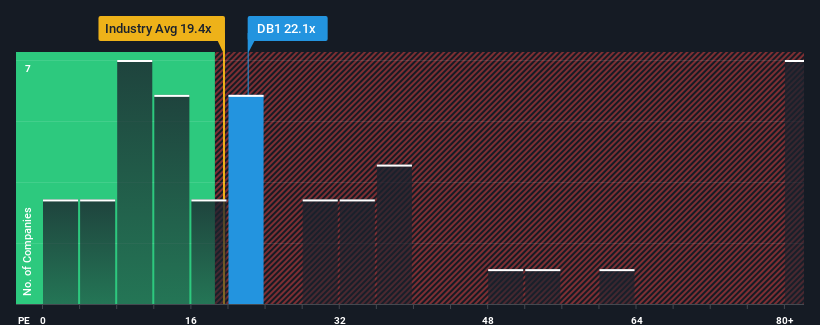- Germany
- /
- Capital Markets
- /
- XTRA:DB1
Deutsche Börse AG (ETR:DB1) Investors Are Less Pessimistic Than Expected
Deutsche Börse AG's (ETR:DB1) price-to-earnings (or "P/E") ratio of 22.1x might make it look like a sell right now compared to the market in Germany, where around half of the companies have P/E ratios below 15x and even P/E's below 10x are quite common. Although, it's not wise to just take the P/E at face value as there may be an explanation why it's as high as it is.
Deutsche Börse certainly has been doing a good job lately as it's been growing earnings more than most other companies. It seems that many are expecting the strong earnings performance to persist, which has raised the P/E. You'd really hope so, otherwise you're paying a pretty hefty price for no particular reason.
See our latest analysis for Deutsche Börse

Is There Enough Growth For Deutsche Börse?
Deutsche Börse's P/E ratio would be typical for a company that's expected to deliver solid growth, and importantly, perform better than the market.
Retrospectively, the last year delivered a decent 10% gain to the company's bottom line. Pleasingly, EPS has also lifted 60% in aggregate from three years ago, partly thanks to the last 12 months of growth. So we can start by confirming that the company has done a great job of growing earnings over that time.
Turning to the outlook, the next three years should generate growth of 5.6% per year as estimated by the twelve analysts watching the company. Meanwhile, the rest of the market is forecast to expand by 16% each year, which is noticeably more attractive.
With this information, we find it concerning that Deutsche Börse is trading at a P/E higher than the market. Apparently many investors in the company are way more bullish than analysts indicate and aren't willing to let go of their stock at any price. There's a good chance these shareholders are setting themselves up for future disappointment if the P/E falls to levels more in line with the growth outlook.
The Key Takeaway
Generally, our preference is to limit the use of the price-to-earnings ratio to establishing what the market thinks about the overall health of a company.
We've established that Deutsche Börse currently trades on a much higher than expected P/E since its forecast growth is lower than the wider market. When we see a weak earnings outlook with slower than market growth, we suspect the share price is at risk of declining, sending the high P/E lower. Unless these conditions improve markedly, it's very challenging to accept these prices as being reasonable.
You should always think about risks. Case in point, we've spotted 1 warning sign for Deutsche Börse you should be aware of.
If these risks are making you reconsider your opinion on Deutsche Börse, explore our interactive list of high quality stocks to get an idea of what else is out there.
New: Manage All Your Stock Portfolios in One Place
We've created the ultimate portfolio companion for stock investors, and it's free.
• Connect an unlimited number of Portfolios and see your total in one currency
• Be alerted to new Warning Signs or Risks via email or mobile
• Track the Fair Value of your stocks
Have feedback on this article? Concerned about the content? Get in touch with us directly. Alternatively, email editorial-team (at) simplywallst.com.
This article by Simply Wall St is general in nature. We provide commentary based on historical data and analyst forecasts only using an unbiased methodology and our articles are not intended to be financial advice. It does not constitute a recommendation to buy or sell any stock, and does not take account of your objectives, or your financial situation. We aim to bring you long-term focused analysis driven by fundamental data. Note that our analysis may not factor in the latest price-sensitive company announcements or qualitative material. Simply Wall St has no position in any stocks mentioned.
About XTRA:DB1
Deutsche Börse
Operates as an international exchange organization in Germany, rest of Europe, the United States, and the Asia-Pacific.
Flawless balance sheet established dividend payer.
Similar Companies
Market Insights
Community Narratives



